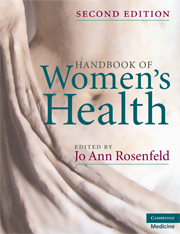Book contents
- Handbook of Women's Health
- Handbook of Women's Health
- Copyright page
- Dedication
- Contents
- Contributors
- Section 1 Introduction
- Section 2 Sexuality
- Section 3 Genitourinary concerns
- Section 4 Breast disorders
- Section 5 Psychological concerns
- Chapter 21 Intimate partner violence against women
- Chapter 22 Depression
- Chapter 23 Alcoholism, nicotine dependence and drug abuse
- Section 6 Common medical problems
- Index
Chapter 22 - Depression
from Section 5 - Psychological concerns
Published online by Cambridge University Press: 26 December 2009
- Handbook of Women's Health
- Handbook of Women's Health
- Copyright page
- Dedication
- Contents
- Contributors
- Section 1 Introduction
- Section 2 Sexuality
- Section 3 Genitourinary concerns
- Section 4 Breast disorders
- Section 5 Psychological concerns
- Chapter 21 Intimate partner violence against women
- Chapter 22 Depression
- Chapter 23 Alcoholism, nicotine dependence and drug abuse
- Section 6 Common medical problems
- Index
Summary
Keywords
- Type
- Chapter
- Information
- Handbook of Women's Health , pp. 239 - 250Publisher: Cambridge University PressPrint publication year: 2009



